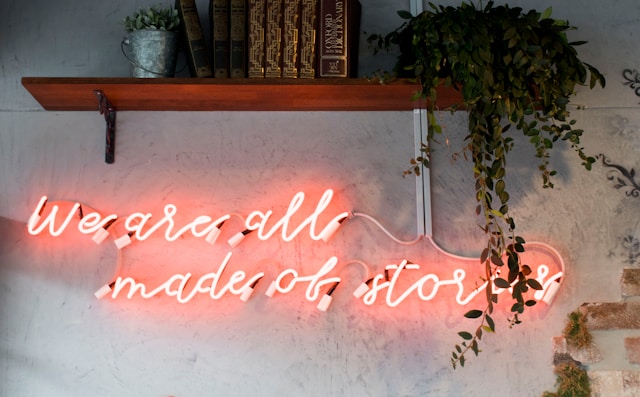We are surrounded all day by stories. What kind of relationship you have with your coworkers is a story, based on your last few interactions and major events that might have occurred with them. Even how you slept last night is a story. It is shaped by how you feel in the morning and what you remember (or don’t) about the night before.
We tell ourselves little stories throughout our days, which we weave into larger stories about what has happened. Stories about our pasts are how we maintain a coherent sense of ourselves, our lives, and our relationships. These stories are always open to changes, though. One of the strongest influences on how we tell our stories are who we co-construct our stories with.
Think about it – is the way you would tell a mildly amusing, mildly frustrating work story to your significant other the same way you would tell it to your boss? With your significant other, you might vent about your day, and play up the frustrating parts of the story. Or maybe use the opportunity to try to make them laugh and have a light mood, by exaggerating the amusing parts. With your boss, on the other hand, you might focus on the issues affecting the work as they showed up in the story. Who we tell our stories with makes a huge difference in how we co-construct our worlds.
Similarly, no one person is the same moment-to-moment and day-to-day. For example, lets say you have to share with friends that you’ve been having trouble in your relationship. If you are all casually hanging out with lots of loud jokes and laughter, think about how you frame your relationship concerns:
- Probably in ways to keep the group’s mood light?
- Maybe with some jokes at your own expense (or your significant others’).
- With those same friends at a quiet, formal restaurant, how would you tell the story differently?
- You might let yourself feel more deeply the hurt and sadness, and it might come out in the story differently.
Same story, same people, but the moment deeply affects how you co-construct what has happened.
This is part of why therapists talk about co-constructing a “healing experience” in therapy. The same stories, told in different ways, with different people, can bring healing or hurt. Stories can bring you closer to those you love, or push them further away. For example, sharing a difficult story with someone who is warm, validating, and empathetic can help you heal. But telling that same story to someone who is cold, dismissive, or unempathetic may only add to the pain.
So I invite you, the next time you want to share something personal with a loved one, to take a pause. Check in with yourself – what kind of situation are you in, and what frame of mind are you in? Are you in a place encouraging lighthearted conversation, or deeper sharing? Within yourself, are you in a warm, positive, open mood, or a self-protective mood?
Who you tell and when and where can seriously impact how you share your story and whether it gives you what you hope for. Think about how you want the other person to feel about what you share. Think about how you would like them to feel about you. And think about how you want to feel about what you will have shared. Then co-construct your story with those intentions in mind.
Register for Getting the Love You Want: an immersion relationship workshop for couples.
Register for Keeping the Love You Find: an immersion relationship workshop for individuals.

